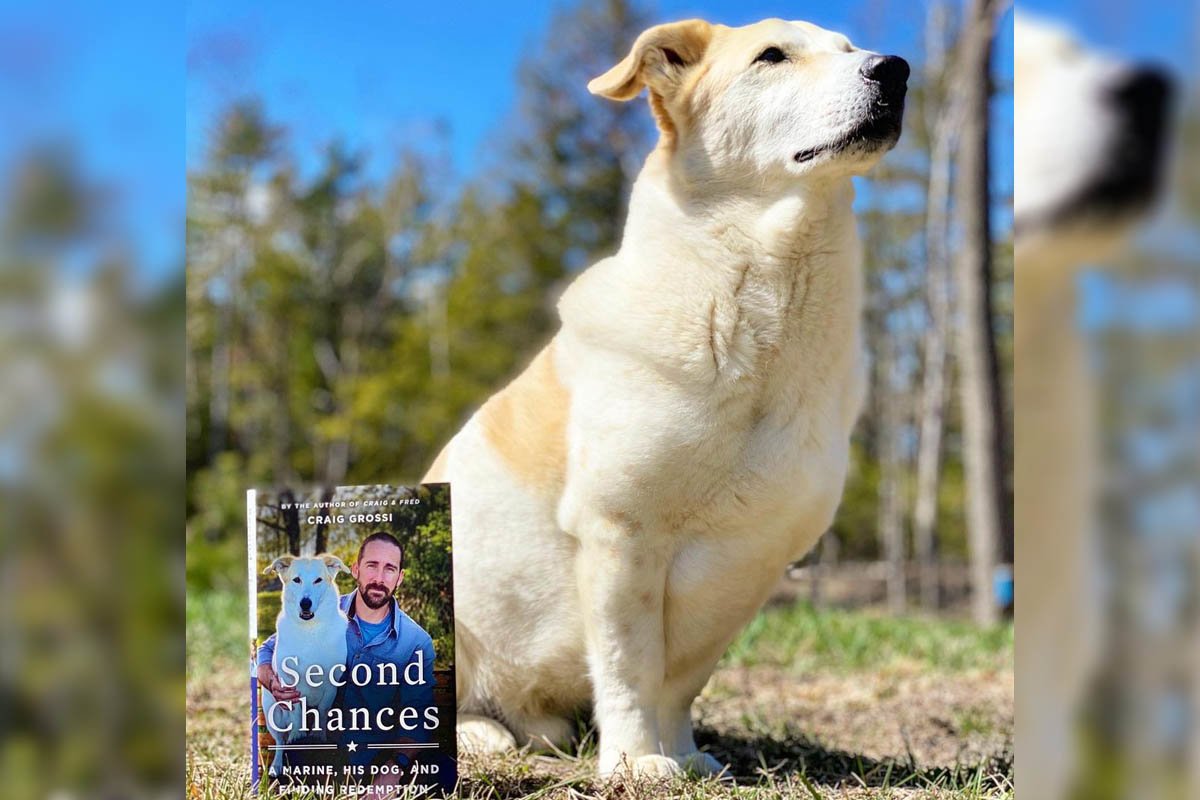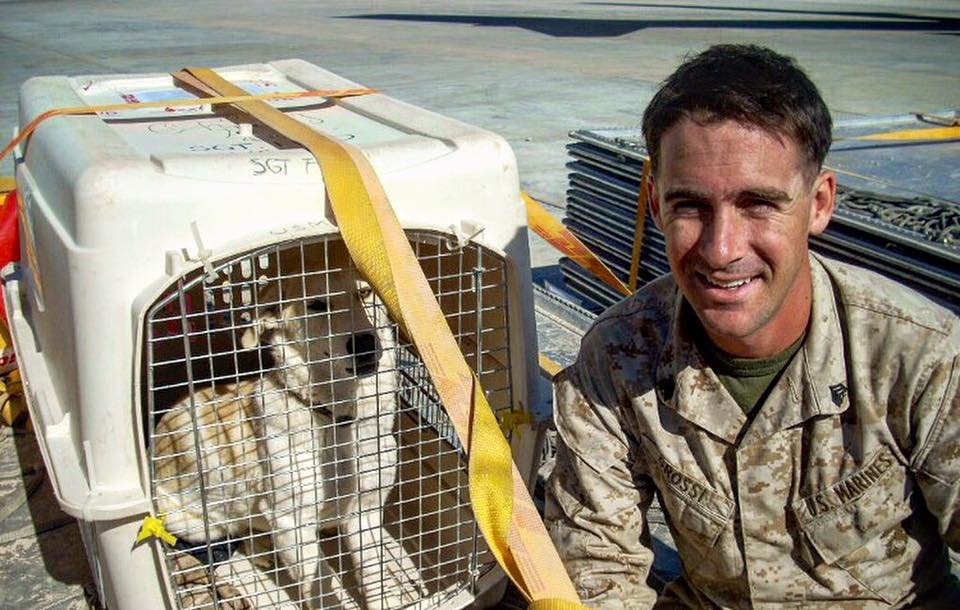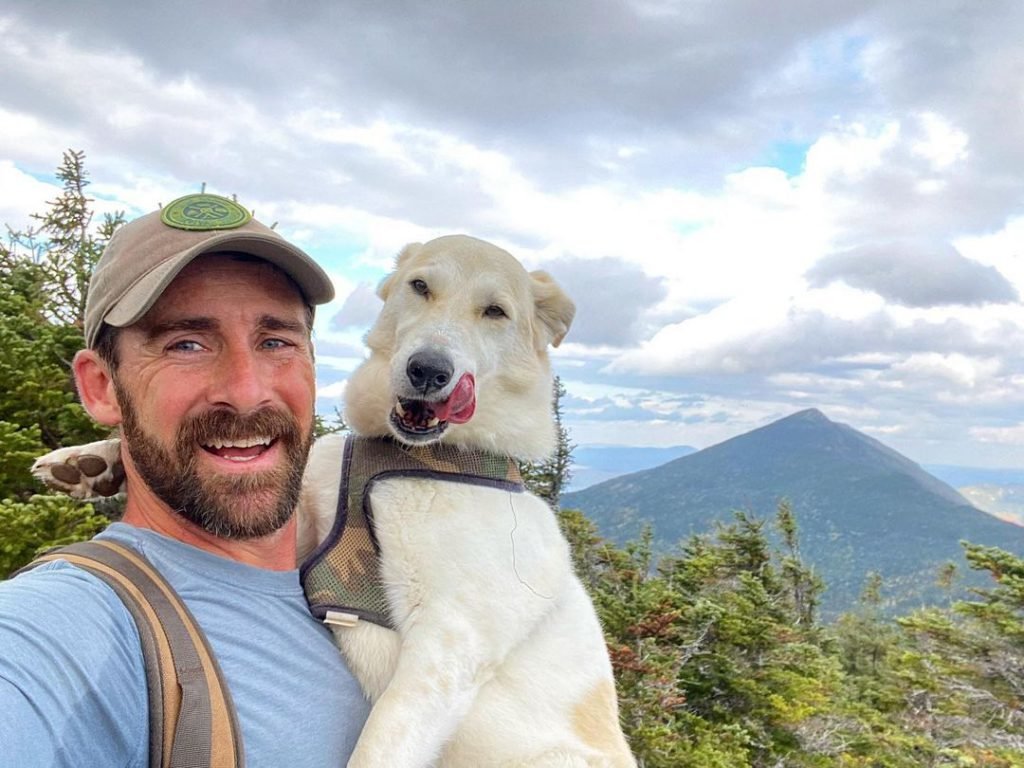In ‘Second Chances,’ Marine Veteran Finds Redemption in Helping Others

Photo courtesy of Craig & Fred/Instagram.
Craig Grossi’s first book, Craig and Fred: A Marine, a Stray Dog, and How They Rescued Each Other, was published in 2017, and he follows that memoir with the similarly titled Second Chances: A Marine, His Dog, and Finding Redemption.
This time around the dogs — plural — wag the tale.
The author and Fred, the stray mutt he smuggled out of Afghanistan near the end of a 2010 deployment, remain photogenic and full of charm, although one is chattier. Each is more traveled, and the pair has companions: Nora (Grossi’s partner) and Ruby, her dog.
Second Chances continues Grossi’s journey to adjustment to civilian life after eight years in the Marine Corps. If you missed Craig and Fred, you can go straight to Second Chances to get filled in. You’ll also gain additional insight — into correctional facilities such as Guantanamo Bay, about the diligence required to train puppies to be service dogs, and about recognizing your own vulnerability, including the risks of alcohol abuse.

The sequel has more perspective and more traction from a more mature Grossi. He “created a career” for himself with the publication of the first book, which put him on the road to success as a public speaker.
While visiting the Maine State Prison (the inspiration for Stephen King’s novella and the 1994 movie Shawshank Redemption), Grossi and Fred meet the men who participate in the nonprofit America’s VetDogs program inside the penitentiary. He becomes enthralled by the prisoners’ situations and their sensitivity toward the puppies they prepare to serve disabled veterans.
Because writing helped Grossi “find purpose” in life, the former sergeant starts a writing group — called Purposeful Tails — for inmates in the Veterans’ Pod section at Maine State.
“I’m not an English teacher,” writes Grossi, who acknowledges his “collaborator and writing coach” Eve Claxton in the book.
“I’m not interested in punctuation or spelling,” he tells the men. “I just love a good story, and I know you guys have a lot to share.”
The men, usually a group of no more than eight, tell personal stories based on the topics Grossi assigns, including dogs, traditions, compassion, alcohol, and car crashes.
The oldest inmate in the group is a white, 1950s Army veteran in his 80s who the guys call Mr. Craig. His story of racism in the aftermath of an automobile accident outside Jacksonville, Florida, in 1959 resonates.
In one rolled-over car, a white man. In another car, “smashed up pretty good,” two Black men. When Mr. Craig asks a state trooper to call an ambulance for the two guys, the officer tells him to “leave the [N-word] be. They take care of themselves.” Ignoring the racist trooper, Mr. Craig helps the Black men.
Compassion from and for an incarcerated man such as Mr. Craig is a virtue Grossi has learned to appreciate and encourage.

“I had joined [the Marine Corps] as a fresh-faced nineteen-year-old with an unflinching view of right and wrong,” Grossi says. His attitude has changed for the better, he believes.
His early Corps experience as a military-police correctional specialist in Cuba and in Charleston, South Carolina, shows him that “The world of crime and punishment isn’t clear-cut and transparent, it’s muddy and inconsistent.”
In Second Chances, Grossi tries to bring clarity and comfort to himself and his new friends at Maine State. “The lessons I’ve learned because of them have shaped how I will live the rest of my life.”
Grossi writes that when he returned from Afghanistan, he “felt like the war was all around me, that every day was a fight to prove to other people that I was okay.”
Not anymore, he says with candor that comes with greater confidence. “I’ve learned that the true measure of a man is how often he can ask for help, demonstrate vulnerability — and show love.”
Read Next: ‘I’m Captain America’ — Marvel Gives America the Hero It Needs in Falcon Finale

J. Ford Huffman has reviewed 400-plus books published during the Iraq and Afghanistan war era, mainly for Military Times, and he received the Military Reporters and Editors (MRE) 2018 award for commentary. He co-edited Marine Corps University Press’ The End of Don’t Ask, Don’t Tell (2012). When he is not reading a book or editing words or art, he is usually running, albeit slowly. So far: 48 marathons, including 15 Marine Corps races. Not that he keeps count. Huffman serves on the board of Student Veterans of America and the artist council of Armed Services Arts Partnership and has co-edited two ASAP anthologies. As a content and visual editor, he has advised newsrooms from Defense News to Dubai to Delhi and back.
BRCC and Bad Moon Print Press team up for an exclusive, limited-edition T-shirt design!
BRCC partners with Team Room Design for an exclusive T-shirt release!
Thirty Seconds Out has partnered with BRCC for an exclusive shirt design invoking the God of Winter.
Lucas O'Hara of Grizzly Forge has teamed up with BRCC for a badass, exclusive Shirt Club T-shirt design featuring his most popular knife and tiomahawk.
Coffee or Die sits down with one of the graphic designers behind Black Rifle Coffee's signature look and vibe.
Biden will award the Medal of Honor to a Vietnam War Army helicopter pilot who risked his life to save a reconnaissance team from almost certain death.
Ever wonder how much Jack Mandaville would f*ck sh*t up if he went back in time? The American Revolution didn't even see him coming.
A nearly 200-year-old West Point time capsule that at first appeared to yield little more than dust contains hidden treasure, the US Military Academy said.












